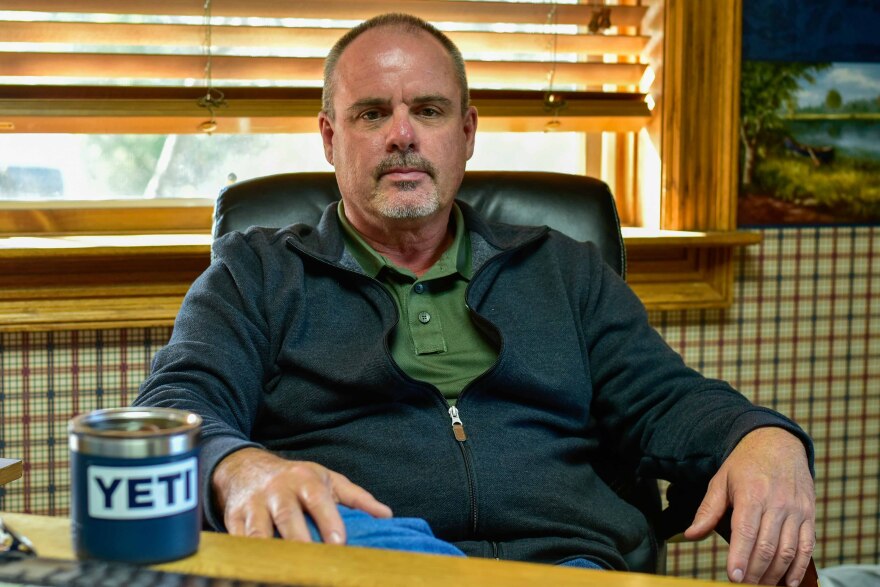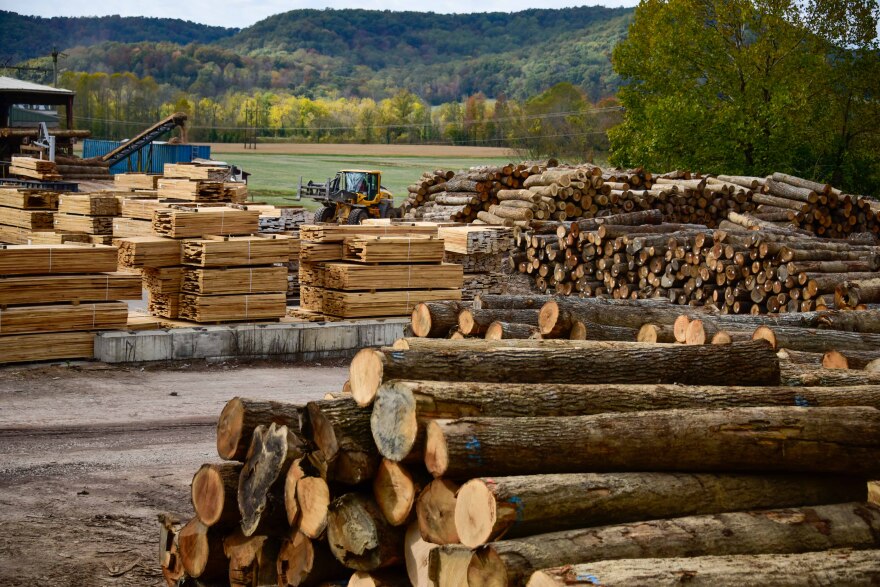GreenTree Forest Products is a family owned sawmill in Wallingford, Kentucky, which is really more of a fork in the road than a town. It employs 90 workers who come from surrounding areas, including Canon Vice.
Vice is in charge of buying logs from dozens of rural logging outfits that come from as far as 100 miles away, across eastern Kentucky and West Virginia. Loggers unload their haul into long rows for Vice to measure, inspect and affix a barcode to.
“We buy all grades and most species,” Vice said. “The main ones being white oak, chestnut oak, red oak, poplar, hickory, soft maple, hard maple, and then everything else, just kind of, you know, gap fillers.”
A small pocket computer totals everything up. Vice then prints off a check and the loggers get paid. Vice’s work is quick, but precise.
“You’ve got to get every single thing right if you're going to make any money in this business,” he said. “If you call a 14-foot log a 16-foot by accident, you've lost money on that log before we ever put in the mill.”

After Vice buys the logs, they go into a giant deafening mill where conveyor belts feed them into saws that cut them again and again to make lumber, which will in turn become hardwood floors, horse fences and bourbon barrels.
But the profit margins are tighter than ever. With a weak market for lumber-hungry home construction and industries like bourbon seeing a slowdown, Green Tree has lumber that’s all dressed up and nowhere to go.
In past years, Green Tree has already cut back from two shifts to one — and they’re still over supplying the market.

James Wells, one of the co-owners, says they want to stay open and keep providing rural jobs, but the price of lumber keeps falling and President Donald Trump’s on-again off-again trade policies, aimed at some of the biggest international lumber buyers, aren’t helping either.
“This is really part two of the tariff situation,” he said.
Wells says before President Trump’s first administration, China bought about half of America’s hardwood exports to make stuff like furniture. In 2018, China ended up smacking 25% retaliatory tariffs on U.S. made lumber.
“That tariff wiped out a lot of big, big, what they call concentration yards: people who buy green lumber, dry it and prep it for export,” he said.
Wells says the industry never really recovered, and now it’s in the middle of trade war round two. China hasn’t directly retaliated against the lumber industry yet. But earlier this year, when it imposed tariffs on U.S. agriculture like soybeans, it also banned the import of American uncut logs.
“Well, they say it's due to pests, but nothing has changed…they were buying logs, and then all of a sudden they weren't because of pests,” Wells said. “What pests developed in a week? I don’t know, you can read into that what you want to.”
After a vague trade deal was announced between President Trump and China, those restrictions appear to be lifting. But the impacts are still lingering.
The Trump administration has promised a relief package for soybean farmers. The lumber industry wants to be considered for aid too.
“If and when there's a relief package that comes along, we have to ensure …that we've got to be a part of that,” said James Wright, executive director of the Kentucky Forest Industries Association. “It's not a guarantee, obviously, but that's our hope.”

KFIA and Green Tree both signed onto an open letter to the federal government in October along with logging and lumber companies from every state in Appalachia including Tennessee and West Virginia.
Wright notes that Trump’s tariffs on imported furniture could eventually have a positive impact on lumber, if it brings that manufacturing back to the states. But that takes time.
Wright said, so far, it’s been putting a lot of rural jobs in jeopardy.
“These are the real world effects of decisions that are being made,” he said. “And as you're looking long term, let's ensure we're getting the desired effect, you know, the original reasoning behind the tariffs.”
Neither the U.S. Department of Agriculture nor the White House responded to emails requesting comment, but auto-replied that communication staff were furloughed due to the government shutdown.
Meanwhile in the front office of Green Tree Forest Products, James Wells is hopeful the letter will elicit some aid, but he isn’t holding his breath.
“I'll just be blunt: The hardwood lumber industry is supposed to be included in agriculture. We always get the shaft,” he said. “I'm not knocking the farmers or the agriculture people, but we don't have the voice they have and most of our industry is family owned, private you know, we just stay to ourselves.”
Meanwhile, he says there’s plenty of healthy forest out there ready to be logged, but with a shrinking workforce and the uncertainty of tariffs, it’ll be a while before it’s cut.
This story was produced by the Appalachia + Mid-South Newsroom, a collaboration between West Virginia Public Broadcasting, WPLN and WUOT in Tennessee, LPM, WEKU, WKMS and WKU Public Radio in Kentucky, and NPR.






